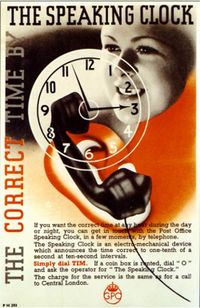Speaking Clock
The Speaking Clock is a Telephone service available 24 hours a day for people who need to know what time it is. Callers need to know what time it is, as this is all they can find out. Callers who already know what time it is should not call the service, as they are in danger of being told information they already know, and this could result in acute boredom. The service is operated by the same woman or a man 24 hours a day, and operators usually work shifts for well over 10 years. In most countries, you can dial a sequence of numbers and the speaking clock is audible.
History[edit | edit source]
In the early 19th century, the need to know the precise time was becoming hugely important due to the increasing demand of dinner and hair appointments by aristocrats and royalty in many parts of the world. As reliable watches had not been invented yet, the only reliable way to find the time was to ring a friend on a mobile phone and ask them to look at the nearest Teletext clock, or use the channel selector on Satellite or Cable television. The demand on phone lines was so great that soon governments around the world declared a state of emergency and the solution was found by employing millions of people to sit and read the time out day and night on a new set of phone lines, most of which where in the highlands of Wales and Scotland.
Today[edit | edit source]
Over time, phone lines have become easier to duplicate, and so issues with the speaking clock becoming engaged are now relatively low. Recent statistics show that now only half of all calls to the speaking clock result in the line being engaged.
The popularity of the speaking clock has seen the release of the full service on an 18 volume CD collection, and more recently has been available for download on most MP3 download providers. The track "2:30 - 2:40" is amongst the most popular, getting to number 2 in the UK music charts, and number 3 in the US music charts. Several mixes of the speaking clock have emerged in many club circuits, the London Underground House scenes and has been a top anthem in Ibiza now for several years.
Critics are unsure of the best speaking clock operator, but it is likely that this will be settled through a television voting competition likely to take place early 2011. Simon Cowell is amongst bidders for the rights to the programme.
The Operator[edit | edit source]
It has been known for the operators to fall asleep during their shift, and callers to think there is an issue with the line, however this has been resolved recently with a contract of energy drinks being supplied to the operator to keep them awake. Often operators would be confused by callers asking them questions or shouting verbal abuse down the line. Telephone operators resolved this by cutting the wire to the headphones, and wiring them to the microphones of other speaking clock operators, in order to create a sense of collaborative working.
Operators have to memorize the full speaking clock script both forwards and backwards. This was introduced to combat the issue of power cuts in the 1970s, and operators would have to guess where the toilet was.
It has also been noted that many operators have hidden messages in their readings, and if played backwards messages such as "I have no life" and "Don't eat yellow snow" can be heard.
Cost[edit | edit source]
Speaking clock services usually cost between $10-15 per second, and minimum call durations are 2.57 minutes. In the UK, calls are charged at the flat rate of £26.32 per minute, with a minimum of 12 minute call duration.

